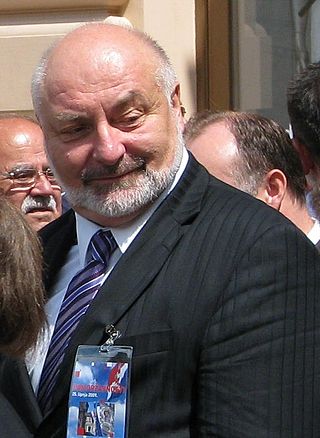
Parliamentary elections to elect all 151 members of the Croatian Parliament were held on 23 November 2003. They were the fifth parliamentary elections to take place since the first multi-party elections in 1990. Voter turnout was 61.7%. The result was a victory for the opposition Croatian Democratic Union (HDZ) which won a plurality of 66 seats, but fell short of the 76 needed to form a government. HDZ chairman Ivo Sanader was named the eighth Prime Minister of Croatia on 23 December 2003, after parliament passed a confidence motion in his government cabinet, with 88 MPs voting in favor, 29 against and 14 abstaining. The ruling coalition going into the elections, consisting of the Social Democratic Party (SDP), Croatian People's Party (HNS), Croatian Peasant Party (HSS), Party of Liberal Democrats (Libra) and the Liberal Party (LS), did not contest the elections as a single bloc; the SDP ran with the Istrian Democratic Assembly (IDS), the Party of Liberal Democrats (Libra) and the Liberal Party, HNS ran with the Alliance of Primorje-Gorski Kotar (PGS) and the Slavonia-Baranja Croatian Party (SBHS), while HSS ran on its own.

The Independent Democratic Serb Party is a social-democratic political party in Croatia representing the interests of the Croatian Serbs. It holds progressive, pro-European stances and is generally considered a centre-left party.

Ivo Sanader is a Croatian former politician who served as Prime Minister of Croatia from 2003 to 2009. He is currently serving a 18-year prison sentence for corruption in Lipovica prison.

The Croatian Democratic Union is a major conservative, centre-right political party in Croatia. Since 2016, it has been the ruling political party in Croatia under the incumbent Prime Minister Andrej Plenković. It is one of the two major contemporary political parties in Croatia, along with the centre-left Social Democratic Party (SDP). It is currently the largest party in the Sabor with 55 seats. The HDZ governed Croatia from 1990 before the country gained independence from Yugoslavia until 2000 and, in coalition with junior partners, from 2003 to 2011, and since 2016. HDZ is a member of the Centrist Democrat International, International Democracy Union, and the European People's Party, and sits in the European People's Party Group in the European Parliament. HDZ is the first political party in Croatia to be convicted of corruption.

The Croatian Peasant Party is an agrarian political party in Croatia founded on 22 December 1904 by Antun and Stjepan Radić as Croatian Peoples' Peasant Party (HPSS). The Brothers Radić believed that the realization of Croatian statehood was possible within Austria-Hungary, but that it had to be reformed as a Monarchy divided into three equal parts – Austria, Hungary and Croatia. After the creation of Kingdom of Yugoslavia in 1918, the Party requested for the Croatian part of the Kingdom to be based on self-determination. This brought them great public support which culminated in 1920 parliamentary election when HPSS won all 58 seats assigned to Croatia.

The Croatian Social Liberal Party is a conservative-liberal political party in Croatia. The HSLS was formed in 1989 as the first Croatian political party formed after the reintroduction of the multi-party system.

Jadranka Kosor is a Croatian politician and former journalist who served as Prime Minister of Croatia from 2009 to 2011, having taken office following the sudden resignation of her predecessor Ivo Sanader. Kosor was the first and so far only woman to become Prime Minister of Croatia since independence.

Parliamentary elections were held in Croatia on 25 November 2007 and for overseas voters on 24 and 25 November. The campaign officially started on 3 November. The President of Croatia announced elections on 17 October and 14 days were allowed for candidate lists to be submitted.

Gordan Jandroković is a Croatian diplomat and politician serving as Speaker of the Croatian Parliament since 2017. He previously served as Minister of Foreign Affairs and European Integration from 2008 to 2011, and as Deputy Prime Minister from 2010 to 2011 in the cabinets of prime ministers Ivo Sanader and Jadranka Kosor.

Slobodan Uzelac is a Croatian Serb politician who served as Deputy Prime Minister of Croatia for Regional Development, Reconstruction and Return in the second cabinet of Prime Minister Ivo Sanader and his successor in that position Jadranka Kosor. He is the first member of the Serb minority in Croatia to hold a cabinet position since the first Croatian multi-party elections were held in 1990.

The Ninth Government of the Republic of Croatia was the first of two Croatian Government cabinets led by Prime Minister Ivo Sanader. It was announced on 23 December 2003 and its term ended on 12 January 2008. All but two cabinet members came from the ruling Croatian Democratic Union (HDZ) party, following their win in the 2003 parliamentary elections.

Damir Polančec is a Croatian politician who served as Minister of Economy, Labour and Entrepreneurship from 2008 to 2009, and as Deputy Prime Minister of Croatia from 2005 to 2009, in the cabinets of two prime ministers, Ivo Sanader and Jadranka Kosor.

Parliamentary elections were held in Croatia on Sunday, 4 December 2011 to elect 151 members to the Croatian Parliament. They were the sixth parliamentary election in Croatia since independence.

The Eleventh Government of the Republic of Croatia was the Croatian Government cabinet led by Prime Minister Jadranka Kosor. It was announced on 6 July 2009 and its term ended on 23 December 2011. The cabinet came into existence after Prime Minister Ivo Sanader abruptly resigned on 1 July 2009, designating Kosor as his successor and making her the first woman to serve as prime minister since Croatia gained independence in 1991. It was succeeded by the Cabinet of Zoran Milanović following the centre-left Kukuriku coalition's success in the 2011 parliamentary elections.

The Eight Government of the Republic of Croatia was the second of two Croatian Government cabinets led by Prime Minister Ivica Račan. It was announced on 30 July 2002 and its term ended on 23 December 2003. Račan's second cabinet was formed after Croatian Social Liberal Party (HSLS) and Istrian Democratic Assembly (IDS) had decided to leave the ruling six-party coalition. The cabinet was succeeded by Cabinet of Ivo Sanader I, following the centre-right Croatian Democratic Union's return to power in the 2003 parliamentary elections.
Opinion polling for the 2011 Croatian parliamentary election started early after the previous election with polls on individual parties. As electoral coalitions were formed, coalition ratings started to be polled as well. The poll results below are listed by category and ordered in reverse chronological order. Major political events are indicated chronologically between individual polls. Concurrent polling was at the time also done for the 2012 Croatian European Union membership referendum.
Since its founding in 1989, elections within the Croatian Democratic Union were held numerous times.

Davor Ivo Stier is a Croatian-Argentine politician and diplomat serving as member of the European Parliament since July 2024, having previously served from 2013 to 2016. He was a member of the Croatian Parliament in multiple terms, as well as the Minister of Foreign and European Affairs and Deputy Prime Minister of Croatia from 2016 to 2017.

















